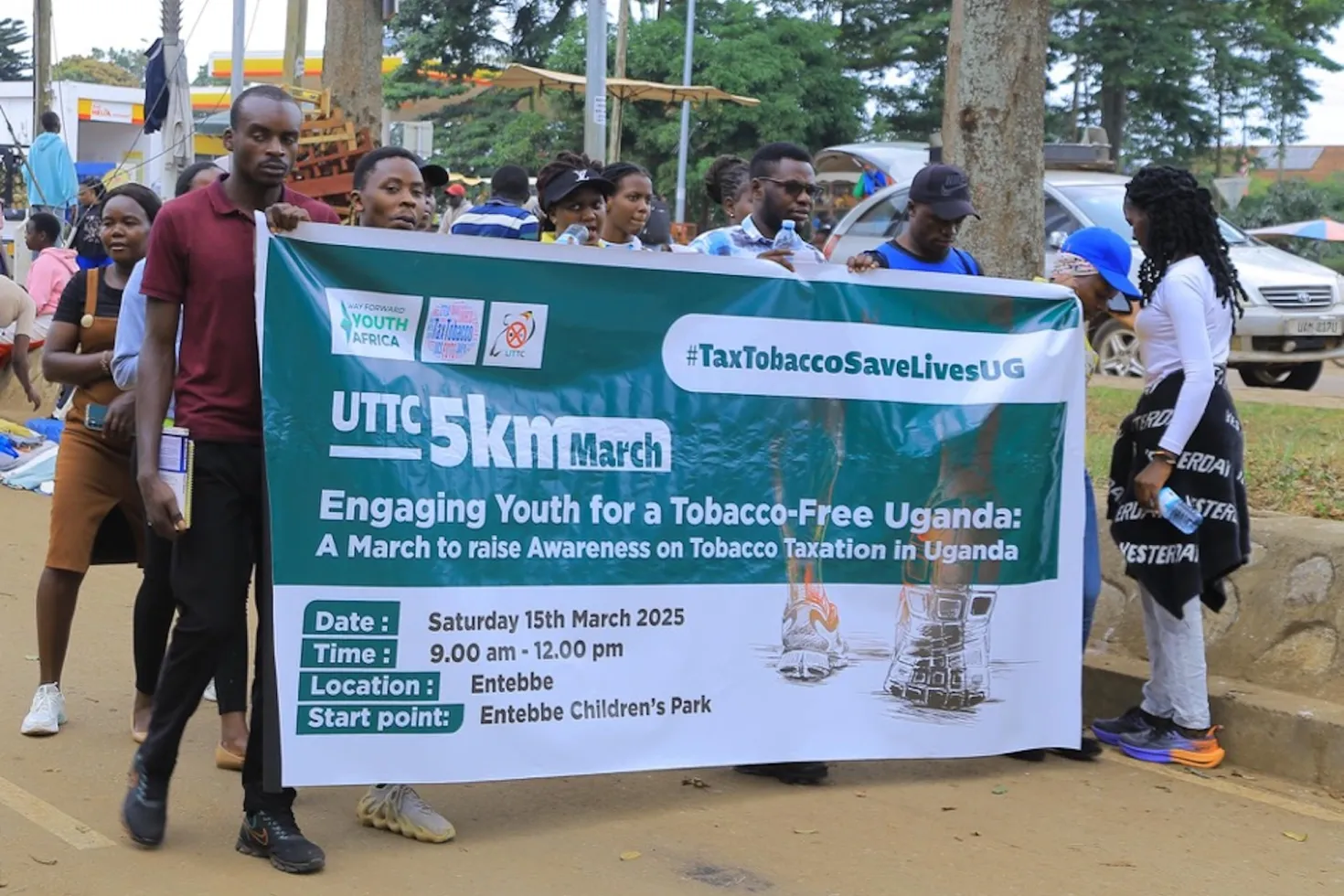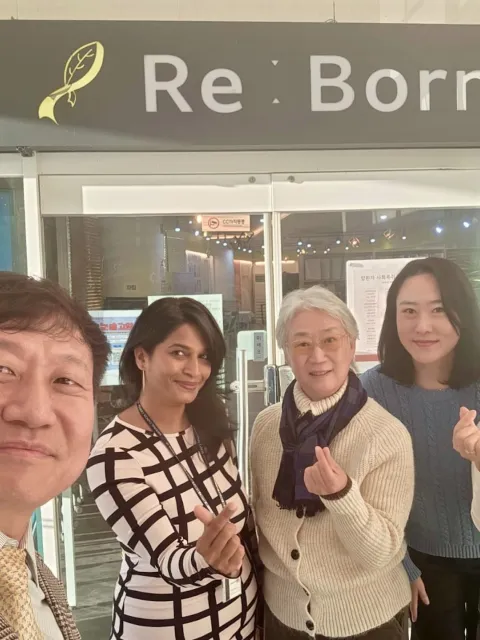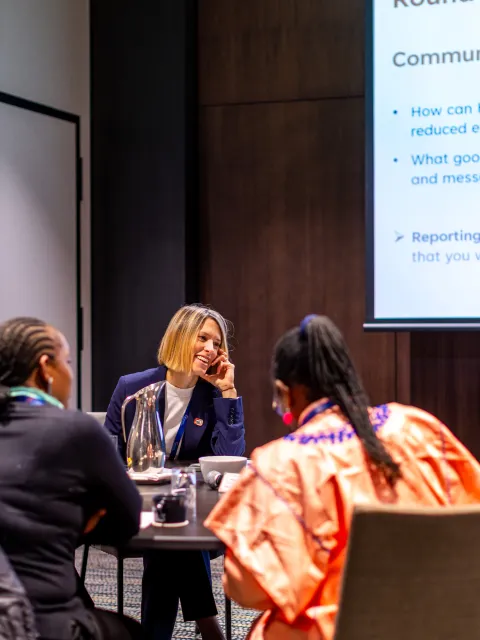Kenya and Uganda step up efforts to raise tobacco taxes and curb industry interference
Legislative efforts to increase tobacco taxation and reduce tobacco consumption have gathered momentum in Kenya and Uganda over the past year, following sustained civil society mobilisation and coordinated policy advocacy supported by UICC and Cancer Research UK.

Backed by UICC and UICC member and partner Cancer Research UK, organisations in Kenya and Uganda are advancing tobacco tax reforms through civil society coalitions challenging industry tactics and prioritising public health.
HIGHLIGHTS
-
UICC and Cancer Research UK supported local coalitions in Kenya and Uganda through a regional programme focused on strengthening tobacco control.
-
In Kenya, advocacy led by KTNTC resulted in a landmark policy change in December 2024, scrapping the dual cigarette tax system and unifying rates after eight years of civil society pressure.
-
In Uganda, UTTC’s campaigns ended a seven-year tax freeze and achieved a major win in April 2025, with Parliament doubling taxes on imported cigarettes after widespread community mobilisation.
-
Both countries face ongoing industry interference and are calling for sustained annual tax hikes and regulation of emerging nicotine products to protect public health.
In Kenya, a major legislative milestone was reached in December 2024 with the harmonisation of cigarette tax rates, ending an industry-favoured tiered system that had taxed filtered and plain cigarettes at different levels since 2017.
“For nearly eight years, we campaigned for a single uniform rate. The breakthrough came through coalition efforts which unified civil society voices and amplified the call for equity in taxation,” said Celine Awuor, CEO of the International Institute for Legislative Affairs (IILA).
IILA is a UICC member and part of the 2023-2024 Cancer Advocates programme. It assists government and civil society in developing policies and laws addressing public health and development priorities.
UICC has partnered with its member and partner Cancer Research UK (CRUK) on “The Cancer Prevention Programme: Strengthening Tobacco Control in East Africa”, supporting civil society coalitions in Kenya and Uganda to advocate for effective tobacco taxes.
As part of this programme, the Kenya Tobacco and Nicotine Tax Coalition (KTNTC) has brought together eight civil society organisations with distinct constituencies (youth, patients, informal workers, and policy experts) and focuses (advocacy, cancer prevention, NCDs). The coalition is led by the Kenya Tobacco Control Alliance (KETCA) and includes IILA, the Consumer Information Network, and the Kenya Network of Cancer Organisations, a UICC member.
“This coalition has given civil society a unified platform to influence fiscal health policy at the highest level,” said Joel Gitali, Chairperson of KETCA.
Over the past year, the KTNTC has advanced a four-pronged strategy to reform tobacco taxation: building a strong coalition, designing FCTC-aligned tax policy, monitoring industry interference, and mobilising communities – especially youth and affected persons – into the advocacy process.
“The diversity of our coalition helped us expand reach and deepen impact. Instead of a single submission, we had more than 50 memoranda echoing the same message during the Finance Bill process,” said Awuor. The coalition’s members also provided oral submissions to the parliamentary finance committee and engaged directly with legislators and Ministry of Finance officials.
Celine Awuor has been personally affected by the impact of non-communicable diseases (NCDs), losing her father to heart-related complications and seeing her mother struggle with diabetes and hypertension. She is keenly aware of the influence that companies selling unhealthy products can have on the availability and accessibility of these products that pose significant risks of developing NCDs.
Public health advances in tobacco control in particular, she says, have been consistently challenged by industry interference. “Kenya has seen a decline in smoking prevalence over the past decade, from double digits to 5-6%, thanks to strong legislative measures. But passing the Tobacco Control Act in 2007, which banned advertising, promotion, and sponsorship, took more than 10 years due to sustained pushback from the industry.”
Despite the success of the recent legislation on taxation, Awuor emphasised that Kenya’s tobacco taxes still fall short of WHO’s recommended threshold of 70% of the retail price. She also warned of emerging challenges: “Even as we strengthen cigarette taxation, we must anticipate substitution with other nicotine products. The growing use of e-cigarettes and nicotine pouches, especially among youth, threatens to undercut our gains.”
Awuor noted that industry marketing has shifted online. “We are seeing a lot now happening with digital marketing, especially of these new products, in ways that undermine conventional tobacco control,” she said.
KTNTC notably organised a series of workshops to engage youth and counter tobacco industry interference by training youth leaders, bloggers, and journalists in media storytelling.
Awuor also underscored the need for sustained advocacy to adjust tobacco taxes in line with inflation and income growth, and called for long-term investment in tobacco tax advocacy, highlighting the annual nature of Kenya’s budget process. “This is not a one-time fight. Each year, we must defend past gains and push for further reforms,” she said.
This adds to the struggle against tobacco industry interference. “Every year, when we try to raise taxes, the industry lobbies policymakers, framing tobacco tax as a threat to jobs, and exploiting political dynamics to block reforms. More recently, industry marketing has shifted online, using digital platforms to promote newer nicotine products that bypass existing legislation.”
Still, Celine Awuor remains optimistic about the direction of the movement: “I am hoping we can get to the point where tobacco control becomes a political priority that parties defend even when other issues come up in Parliament.”

The Tobacco Control room is a dedicated space for professionals, researchers, activists, and advocates who are passionate about combating tobacco products use and its harmful effects.
Uganda coalition also driving momentum for stronger tobacco control
Similar progress is taking shape in Uganda, where the joint UICC–CRUK programme also helped establish the Uganda Tobacco-Taxation Coalition (UTTC), bringing together a broad alliance of organisations including the Uganda Cancer Society, a UICC member.
Led by the Uganda National Health Consumers’ Organisation (UNHCO), UTTC has rallied youth, community leaders, and health advocates, to end a seven-year freeze on tobacco tax increases.
Between December 2024 and May 2025, UTTC organised school-based education sessions, a five-kilometre march in Entebbe, public forums in low-income areas, and media campaigns to expose the health and economic impacts of tobacco use and counter industry narratives. The coalition also engaged directly with parliamentary committees.
“We brought the conversation to schools, communities, and the streets to ensure that Ugandans understand the cost of tobacco, both to their health and to the economy,” said Robinah Kaitiritimba, Executive Director of UNHCO. “By working together across sectors, we were able to deliver a unified message to Parliament that taxation is not just a revenue issue, it’s a public health necessity.”
Notably in February, UTTC convened a community dialogue in Kimombasa, a low-income area in Kampala, to raise awareness about the health and economic impacts of tobacco use. The session brought together youth, parents, local leaders, health workers and media to discuss the importance of raising tobacco taxes. The event was covered by national television and amplified community voices in favour of tax reform.
UTTC’s engagement with the media – including a press conference highlighting industry interference and a national TV segment – has helped extend the campaign’s reach and shift public narrative.
The effort was also acknowledged by government officials. “This is the first time I have seen concerted effort among civil society on the issue of tobacco taxes,” said Dr Hafsa Lukwata, the Ministry of Health’s National Tobacco Control Focal Person.
The coalition’s efforts culminated in the presentation of a unified civil society proposal to Uganda’s Parliament in April 2025. The proposal called for doubling cigarette excise taxes, adopting a single-tier tax structure, and introducing an annual increase indexed to inflation and income levels.
While the proposal to double taxes on imported cigarettes was adopted, the tax on locally manufactured products was raised only marginally. UTTC has since reiterated that sustained annual tax increases, linked to inflation and income growth, are essential to reducing consumption over time and protecting public health.
According to UTTC, a key obstacle remains the tobacco industry’s influence over lawmakers, especially those from tobacco-growing regions. “Despite broad support from the Ministries of Health and Finance, some MPs resisted our proposals, citing economic concerns. But our evidence shows the health and fiscal costs of inaction are far greater,” Kaitiritimba said.
Both the Kenya and Uganda coalitions highlight the value of cross-sector advocacy and the need to frame tobacco taxation in economic terms to counter industry narratives. As Celine Awuor noted, “It is not enough to speak about health impacts alone. We must frame the argument in terms that resonate with finance officials and legislators – using economic evidence and coordinated citizen demand.”
These efforts reflect a growing movement in East Africa to prioritise public health through fiscal policy, and ensure that tobacco control keeps pace with evolving industry tactics. This aligns with the theme of World No Tobacco Day 2025, ‘Unmasking the appeal’, by challenging tobacco industry tactics that undermine public health, especially among young people, and pushing for stronger regulation of emerging nicotine products and greater transparency in policymaking to protect future generations from the harms of tobacco use.
Last update
Monday 02 June 2025
